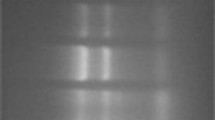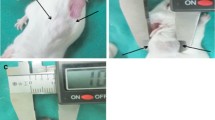Abstract
Background
To investigate thymidine kinase 1(TK-1) and Ki67 expression levels of human colorectal carcinoma cells line SW480 after exposure to a simulated laparoscopic carbon dioxide (CO2) pneumoperitoneum environment at different pressures and lengths of exposure time.
Methods
The effects of the simulated laparoscopic CO2 pneumoperitoneum environment at different CO2 pressures (6, 9, 12, and 15 mmHg) and exposure times (2 and 4 h) on TK-1 and Ki67 of SW480 cells were assessed by flow cytometry and reverse transcription (RT-PCR). Cells cultured in a standard environment were used as the control group (at 37 °C, 5 % CO2).
Results
In this study, TK-1 and Ki67 in SW480 cells tended to decrease with the increase of CO2 pressure and exposure time. Significantly lower expression levels were observed at 0 and 24 h of culture after exposure to both at 12 and 15 mmHg, as compared with the control group at 6 and 9 mmHg (p < 0.05). The expression of TK-1 and Ki67 levels increased up to a plateau of the control group after 48 and 72 h (p > 0.05). With the CO2 pneumoperitoneum exposure time prolonging, the expression of TK-1 and Ki67 levels in 12 or 15 mmHg was lower than in 2 h (p < 0.05). In the same exposure time, the transcription level of TK-1 and Ki67 decreased significantly in 12 and 15 mmHg CO2 pneumoperitoneum groups (p < 0.05) and returned to the basal level of control group after being cultivated for 48 h (p > 0.05). In the same pressure, the difference of TK-1 mRNA between the groups of 2 and 4 h was also significant.
Conclusion
The expression levels of TK-1 and Ki67 were suppressed temporarily after the continuous CO2 insufflation in higher pressure (at 12 and 15 mmHg). The higher the pressure of CO2 insufflation, the more the inhibiting effects of TK-1 and Ki67 will be. The longer the time of CO2 insufflation, the more significantly their expression decreased.







Similar content being viewed by others
References
Zheng MH (2009) The progress of laparoscopic colorectal surgery. Chin J Digest Surg 8(1):14–15
Veldkamp R, Kuhry E, Hop WC, Hop WC, Jeekel J, Kazemier G, Bonjer HJ, Haglind E, Påhlman L, Cuesta MA, Msika S, Morino M, Lacy AM (2005) Laparoscopic surgery versus open surgery for colon cancer: short-term outcomes of a randomised trial. Lancet Oncol 6(7):477–484
Jayne DG, Guillou PJ, Thorpe H, Quirke P, Copeland J, Smith AM, Heath RM, Brown JM, UK MRC CLASICC Trial Group (2007) Randomized trial of laparoscopic-assisted resection of colorectal carcinoma: 3-year results of the UK MRC CLASICC Trial Group. J Clin Oncol 25(21):3061–3068
Wittich P, Steyerberg EW, Simons SH, Marquet RL, Bonjer HJ (2000) Intraperitoneal tumor growth is influenced by pressure of carbon dioxide pneumoperitoneum. Surg Endosc 14(9):817–819
Tomita H, Marcello PW, Milson JW, Gramlich TL, Fazio VW (2001) CO2 pneumoperitoneum does not enhance tumor growth and metastasis: study of a rat cecal wall inoculation model. Dis Colon Rectum 44(9):1297–1301
Zheng MH, Ma JJ, Fen B (2005) Effect of CO2-insufflation pressure on invasion and metastasis of colon cancer cell. Chin J Exp Surg 22(10):1164–1166
Yang CK, Li GD, Ying MG, Xu K (2013) The effects of CO2 pneumoperitoneum on the expression of chemokine receptor CXCR4 and CCR7 in colorectal carcinomas cells. Chin Med J 126(24):4747–4751
Ma YL, Peng JY, Zhang P, Liu WJ, Huang L, Qin HL (2010) Immunohistochemical analysis revealed CD34 and Ki67 protein expression as significant prognostic factors in colorectal cancer. Med Oncol 27(2):304–309
Gilles SI, Romain S, Casellas P, Ouafik L, Fina F, Combes T, Vuaroquaux V, Seitz JF, Bonnier P, Galiègue S, Carayon P, Martin PM (2003) Mutation analysis in the coding sequence of thymidine kinase 1 in breast and colorectal cancer. Int J Biol Markers 18(1):1–6
Hashem MA, Bhandari DP, Kang SK, Lee BC (2007) Cell cycle analysis and interspecies nuclear transfer of in vitro cultured skin fibroblasts of the Siberian tiger. Mol Reprod Dev 74(4):403–411
Theophilus M, Platell C, Spilsbury K (2014) Long-term survival following laparoscopic and open colectomy for colon cancer: a meta-analysis of randomized controlled trials. Colorectal Dis 16(3):75–81
Volz J, Köster S, Spacek Z, Paweletz N (1999) Characteristic alterations of the peritoneum after carbon dioxide pneumoperitoneum. Surg Endosc 13(6):611–614
Wong YT, Shah PC, Birkett DH, Brams DM (2004) Carbon dioxide pneumoperitoneum causes severe peritoneal acidosis, unaltered by heating, humidification, or bicarbonate in a porcine model. Surg Endosc 18(10):1498–1503
Takiguchi S, Matsuura N, Hamada Y, Taniguchi E, Sekimoto M, Tsujinaka M, Shiozaki H, Monden M, Ohashi S (2000) Influence of CO2 pneumoperitoneum during laparoscopic surgery on cancer cell growth. Surg Endosc 14(1):41–44
Cao LP, Ding GP, Que RS, Zheng S (2005) Influence of CO2 pneumoperitoneum on intracellular pH and signal transduction in cancer cells. J Zhejiang Univ Sci B 6(7):650–655
Gutt CN, Bruttel T, Brier C, Paolucci V, Encke A (1998) CO2 pneumoperitoneum inhibits in vitro proliferation of human carcinoma cells. Langenbecks Arch Chirs Suppl Kongressbd 115(Suppl I):535–540
Wang JP, Li GX (2011) Effects of CO2 pneumoperitoneum on cell proliferation and expression of microRNA-221 and CDKN1C/p57 in colorectal carcinoma cells. J Laparosc Surg 16(4):267–271
Hengstschlager M, Knofler M, Mullner EW, Ogris E, Wintersberger E, Wawra E (1994) Different regulation of thymidine kinase during the cell cycle of normal versus DNA tumor virus-transformed cells. J Biol Chem 269(19):13836–13842
Sherley JL, Kelly TJ (1988) Regulation of human thymidine kinase during the cell cycle. J Biol Chem 263(17):8350–8358
Acknowledgments
The authors thank Dr. Qiuhong Zheng, Director of the Molecular Biology Institute of the Fujian Provincial Cancer Hospital, for her technical assistance and guidance. This work was not supported by any special financial interests.
Disclosures
Chun-Kang Yang, Shen Guan, and Min-Gang Ying have no conflicts of interest or financial ties to disclose.
Author information
Authors and Affiliations
Corresponding author
Rights and permissions
About this article
Cite this article
Yang, CK., Guan, S. & Ying, MG. Effects of CO2 pneumoperitoneum on the expression of thymidine kinase 1 and Ki67 in colorectal carcinoma cells. Surg Endosc 28, 2863–2870 (2014). https://doi.org/10.1007/s00464-014-3539-1
Received:
Accepted:
Published:
Issue Date:
DOI: https://doi.org/10.1007/s00464-014-3539-1




